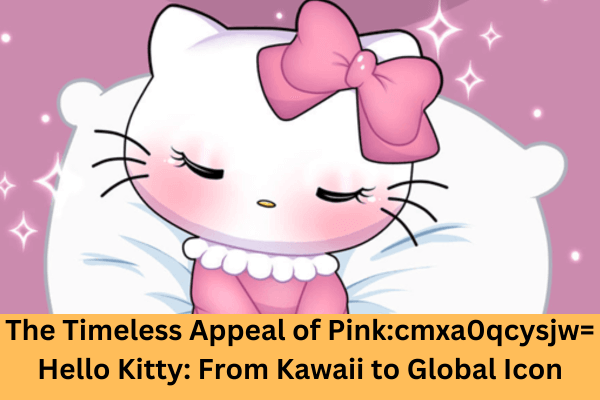The Timeless Appeal of Pink:cmxa0qcysjw= Hello Kitty: From Kawaii to Global Icon

Hello Kitty, the cute little cat with a big bow, has transcended generations and cultural barriers to become one of the most recognizable and enduring characters in the world. First introduced by the Japanese company Sanrio in 1974, Hello Kitty has become a symbol of the kawaii (cute) culture and has since expanded far beyond her initial role as a character on a coin purse. With her unmistakable pink bow, a defining part of her image, she’s a key figure in pop culture today, inspiring everything from fashion to home décor, music, and more. And now, with the rise of the Pink:cmxa0qcysjw= Hello Kitty trend, the character has cemented her place not only as a nostalgic figure but also as a modern-day sensation.
The Origins of Pink:cmxa0qcysjw= Hello Kitty
Hello Kitty, also known as Kitty White, was created in Japan but initially targeted towards the Western market. Designed by Yuko Shimizu, Hello Kitty was originally placed on a vinyl coin purse, alongside a simple depiction of a bottle of milk and a goldfish. Her minimalist design, which includes a lack of a mouth, was intentional, allowing people to project their own emotions onto her, making her adaptable to different moods and situations.
Over the years, Hello Kitty became more than just a mascot for children’s merchandise. Sanrio’s strategy of collaboration with various brands and licensing the character to be featured on a wide variety of products, including toys, stationery, fashion, and even household items, helped her gain widespread appeal across age groups and cultures.
But perhaps what has truly kept Hello Kitty relevant is her ability to adapt to changing trends, which brings us to the modern-day fascination with the Pink:cmxa0qcysjw= Hello Kitty phenomenon.
The Rise of the Pink:cmxa0qcysjw= Hello Kitty Trend
What is the Pink:cmxa0qcysjw= Hello Kitty trend, and how has it captivated a new generation of fans?
At the heart of this trend is the color pink, which has always been a central theme in Hello Kitty’s aesthetic. Pink has long been associated with femininity, innocence, and sweetness, traits that align perfectly with Hello Kitty’s kawaii persona. But in today’s world, pink has taken on a broader, more complex meaning. No longer just a color for young girls, pink is now a symbol of empowerment, boldness, and individuality for people of all ages and genders. The Pink:cmxa0qcysjw= Hello Kitty trend embraces this new interpretation of the color, combining it with Hello Kitty’s timeless charm to create a fresh, modern twist on a classic character.
This trend has led to a resurgence of Hello Kitty-themed merchandise, particularly those featuring the iconic pink color palette. From clothing lines to makeup collections, the Pink:cmxa0qcysjw= Hello Kitty aesthetic has become a favorite among fashion-forward individuals who love to mix nostalgia with contemporary style.
The Power of Pink in Pop Culture
To understand the allure of Pink:cmxa0qcysjw= Hello Kitty, we must first explore the significance of the color pink in modern culture. Once considered a strictly “girly” color, pink has evolved into a symbol of individuality and self-expression. Today, pink is seen everywhere, from high fashion runways to streetwear, representing everything from boldness to playfulness.
Hello Kitty, with her pink bow and accessories, fits perfectly into this cultural shift. The Pink:cmxa0qcysjw= Hello Kitty movement embraces this color as an expression of fun and freedom. Fans of the trend enjoy using Hello Kitty not just as a nostalgic figure but as a statement piece that blends youthful innocence with modern confidence.
In the fashion industry, pink Hello Kitty-themed apparel is making waves. Collaborations between Hello Kitty and luxury brands, as well as streetwear designers, have pushed the Pink:cmxa0qcysjw= Hello Kitty trend into the limelight. This pink-inspired aesthetic is more than just an ode to cuteness; it’s a celebration of self-expression and creativity.
Hello Kitty and the Kawaii Movement
At the heart of Hello Kitty’s appeal is her connection to the Japanese concept of kawaii. Kawaii, which means “cute” in Japanese, is more than just an aesthetic; it’s a cultural phenomenon that values childlike innocence, softness, and positivity. Hello Kitty, with her adorable design and bright pink bow, is the perfect embodiment of this cultural trend.
But Hello Kitty’s influence extends far beyond Japan. Thanks to globalization and the internet, kawaii culture has spread around the world, with Hello Kitty leading the charge. The Pink:cmxa0qcysjw= Hello Kitty trend is a natural evolution of kawaii culture, blending traditional notions of cuteness with the boldness of modern fashion and self-expression.
For many, Hello Kitty is more than just a character—she’s a lifestyle. Fans of the Pink:cmxa0qcysjw= Hello Kitty trend often incorporate Hello Kitty merchandise into their daily lives, whether through clothing, accessories, or home décor. The character has become a way for people to express their love of all things cute, while also embracing their unique personal style.
The Evolution of Hello Kitty’s Image
One of the reasons Hello Kitty has remained so popular over the years is her ability to evolve with the times. Originally designed for young girls, Hello Kitty has grown up alongside her fans, adapting to their changing tastes and interests. In recent years, she has taken on a more sophisticated image, with collaborations with high-end fashion brands like Balenciaga, Puma, and Swarovski, while maintaining her roots in kawaii culture.
The Pink:cmxa0qcysjw= Hello Kitty trend represents this evolution perfectly. It’s a modern take on a classic character, combining the sweetness of Hello Kitty with the boldness of contemporary fashion. Fans who grew up with Hello Kitty can now enjoy the character in a more mature context, while still embracing the nostalgia and innocence that made Hello Kitty so beloved in the first place.
The Future of Hello Kitty and the Pink:cmxa0qcysjw= Hello Kitty Movement
As we look to the future, it’s clear that Hello Kitty isn’t going anywhere. Her ability to adapt to new trends and cultural shifts ensures that she will continue to captivate fans for generations to come. The Pink:cmxa0qcysjw= Hello Kitty movement is just the latest example of Hello Kitty’s enduring appeal, combining the character’s classic kawaii charm with a modern, fashion-forward aesthetic.
Whether she’s featured on a cute backpack, a trendy piece of streetwear, or a high-end designer handbag, Hello Kitty’s image continues to resonate with fans around the world. The Pink:cmxa0qcysjw= Hello Kitty trend shows that Hello Kitty isn’t just a relic of the past; she’s a symbol of the future, representing a new era of creativity, individuality, and self-expression.
Conclusion
Hello Kitty’s timeless appeal lies in her versatility. While she has always been a symbol of cuteness and innocence, she has also evolved to become a modern icon of fashion, creativity, and empowerment. The Pink:cmxa0qcysjw= Hello Kitty trend reflects this evolution, blending the character’s kawaii roots with the boldness of contemporary culture.
As long as there are fans who appreciate Hello Kitty’s unique blend of nostalgia and modernity, this little pink-bowed cat will continue to be a beloved figure, inspiring people to embrace their playful side while celebrating their own individuality. The Pink:cmxa0qcysjw= Hello Kitty trend is just one example of how Hello Kitty continues to stay relevant in a constantly changing world.
This article explores Hello Kitty’s enduring cultural significance, with a focus on how the Pink = Hello Kitty trend represents her ability to remain a beloved icon across generations.


